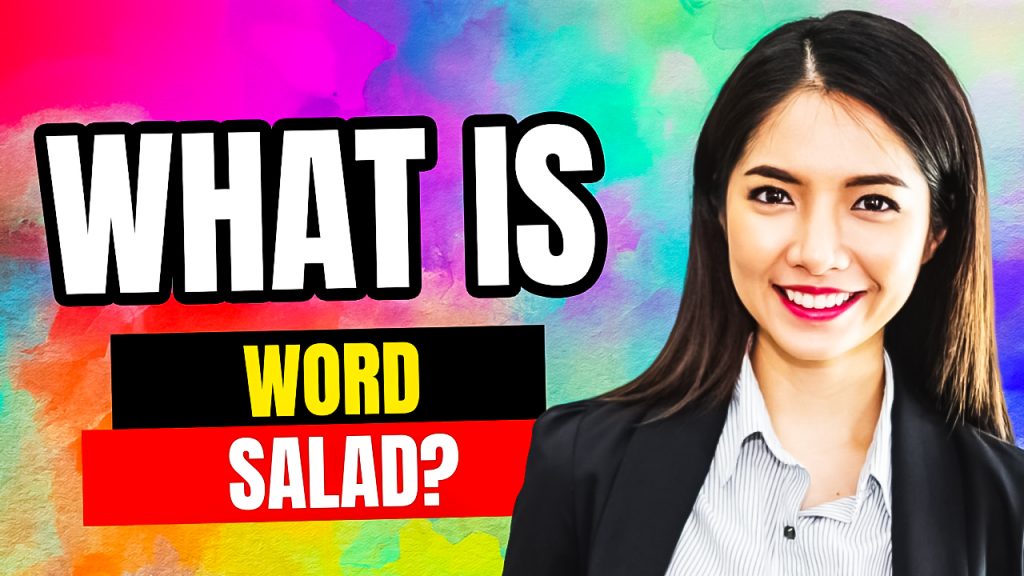
Word salad is a term used to describe a jumbled, incoherent mixture of words and phrases that lack a clear and meaningful connection. This term is often used in the field of psychology to describe a symptom of certain mental disorders, such as schizophrenia, manic episodes, or other types of psychotic disorders. However, word salad can also occur in individuals who do not have any underlying mental health conditions, especially when they are under stress or anxiety.
The word salad can be a challenging symptom to understand because it does not follow the usual patterns of communication. People experiencing word salad may have difficulty expressing their thoughts and feelings in a coherent and logical way, often resulting in disjointed and nonsensical language. The words and phrases they use may not seem to have any relationship to one another, making it difficult for others to understand what they are trying to communicate.
Word salad can take many forms, from disorganized speech patterns to random and unrelated thoughts. In some cases, the individual may speak in a rapid and frenzied manner, jumping from topic to topic without any clear connection between them. Alternatively, the individual may use words and phrases that are unrelated to the topic at hand, making it difficult for others to understand their intended meaning.
The term word salad is commonly used in the context of schizophrenia, a severe mental disorder characterized by a range of symptoms, including delusions, hallucinations, disorganized thinking, and abnormal behavior. People with schizophrenia often experience episodes of word salad, which can be a symptom of their disordered thinking. In some cases, people with schizophrenia may experience auditory hallucinations, which can interfere with their ability to communicate effectively. They may hear voices that interrupt their thoughts, making it difficult for them to express themselves clearly.
Word salad can also occur in individuals with other mental health conditions, such as bipolar disorder, depression, or anxiety disorders. For example, people with bipolar disorder may experience episodes of mania, during which they may speak rapidly and incoherently. Similarly, people with depression may have difficulty organizing their thoughts and expressing themselves effectively, resulting in disordered speech patterns.
However, word salad is not always a symptom of mental illness. It can also occur in individuals who are experiencing extreme stress or anxiety, particularly if they are under pressure to perform or communicate effectively. For example, people who are giving a speech or presentation in front of a large audience may experience word salad due to their nervousness or anxiety.
Word salad can be a challenging symptom to treat because it is often a sign of underlying mental health issues. In some cases, medication and therapy may be helpful in managing the symptoms of word salad. For example, antipsychotic medications may be used to reduce the severity of symptoms in people with schizophrenia, while cognitive-behavioral therapy may be helpful in addressing the underlying thought processes that contribute to disordered speech patterns.
In addition to medication and therapy, there are other strategies that can be helpful in managing word salad. For example, some individuals may benefit from practicing relaxation techniques, such as deep breathing or mindfulness meditation, to help reduce their stress and anxiety levels. Others may benefit from practicing communication skills, such as active listening and clear speaking, to improve their ability to communicate effectively.
In conclusion, word salad is a term used to describe a jumbled, incoherent mixture of words and phrases that lack a clear and meaningful connection. This symptom can be a sign of underlying mental health issues, such as schizophrenia or bipolar disorder, but it can also occur in individuals who are experiencing extreme stress or anxiety. Treatment for word salad may include medication, therapy, relaxation techniques, and communication skills training. While it can be a challenging symptom to manage, with the right support and treatment, individuals with word salad can learn to communicate effectively and express themselves clearly.
This Post is Brought To You By BetterHelp